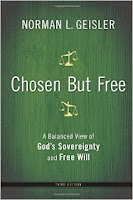God created all things.
Evil is a thing.
Therefore,
God created evil.Love is not evil.
An all-loving God would not create evil.
Therefore,
God is not all-loving (he's evil).That is quite devastating to Christianity, isn't it? The argument is logically valid. If you agree that the premises are true, then you can't escape the conclusions.
I have heard a few people use this argument to disprove the existence of the all-loving God of Christianity. It seems that this argument is quite solid. Logically, it
is sound. But, there is one flaw, not in the logic, but the truth of one of the premises. What's really neat about arguments is that if you can show one premise to be false, all conclusions that follow it (are dependent on it) may be tossed out. Any conclusions above it (not dependent on it) are safe, though.
What's great is that the problem premise in this argument is the second premise. "Evil is a thing". So, we don't have to accept
either of the conclusions. Since I want to claim that "evil is a thing" is false and that "evil is
not a thing", I need to make an argument. So here it goes:
I want to start by defining what the opposite of "evil" is. Good. "Good" is not a thing either. It is a description of God's nature. God has a moral nature that is good. God is not subject to "good" (otherwise "good" would be greater than God, making
it God) and God does not determine "good" (if he did, then "good" would be arbitrarily determined- God
could have made rape good). Instead "good" is a description of God's moral nature. God knows what His moral nature is, so He can tell us what
is "good" and what is "evil". This is called the moral law.
Based on this, an absence of "good" would make something "evil". I want to clarify this, though. Just because something is "not good" does not mean that it is "evil". For instance, take the colors black and white. They are opposites. If presented with the color gray, it would be perfectly acceptable to say that it
is not white, but it would not be acceptable to say that it
is black. Many things are morally neutral. Such as your choice of ice cream. A choice or action does not cross over into the "evil" category unless it is "actively working or standing against" God's moral law or nature.
God created humans "in His image" (the
imago dei) . One of the properties of God's image is the recognition of what is "good" and "evil". However, when sin entered into the world, that ability was clouded. I'll go more into this in a
future post on the depravity of man.
Humans
can discern "good" from "evil" on their own (
Romans 2:14-15). Many secularists can make an argument for
how (not
why) they determine "good" from "evil"- they observe human behavior and nature. But that can only go so far, mainly because human culture changes and what is perceived as "bad" will one day change to "good". Some areas that seem gray may actually be black or white. Since our discernment has been clouded by our sin, we need to refer to God's revelation (the Bible) to help us determine more concretely what is "good" and what is "evil".
Once we recognize that God's standard of good cannot be met; and no matter how hard we try, our good deeds will not restore our relationship with Him, we recognize the need for a Savior. Once we recognize our need and humble ourselves to the point of accepting Jesus as our Savior, then we allow Him to reveal to us even more about His nature and what "good" is.
For more information, I recommend these:
PodcastsJust ThinkingDefendersReasonable FaithStraight ThinkingApologetics.com Radio ShowStand to ReasonBooksWithout a Doubt by Kenneth Samples
Beyond the Cosmos by Hugh Ross









